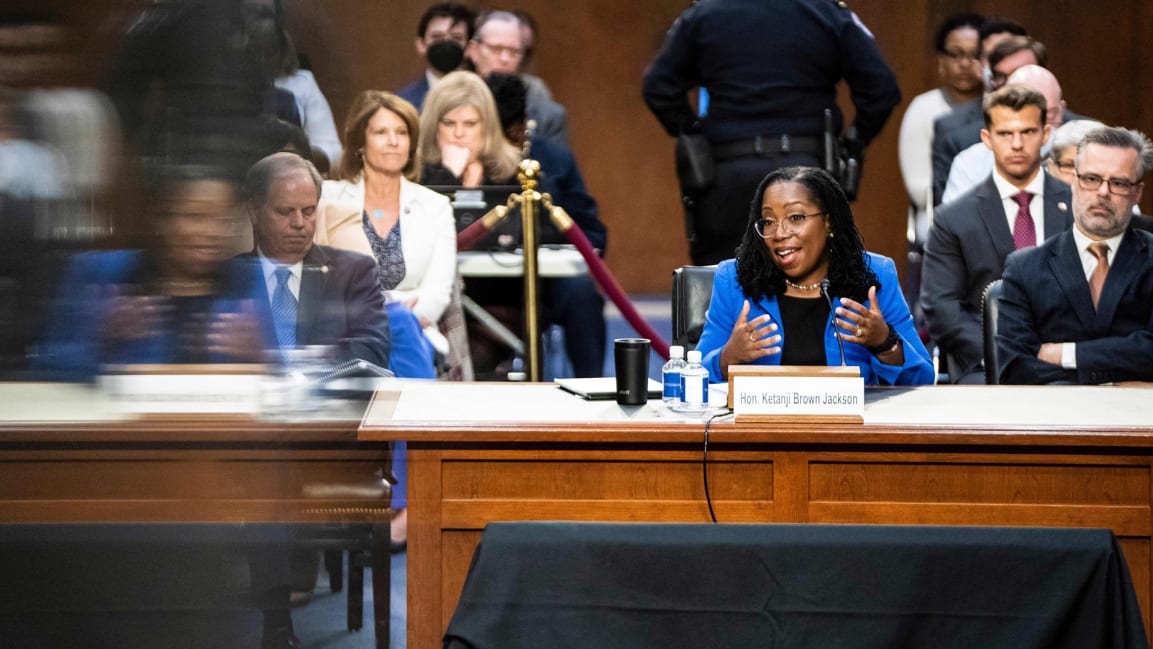Black women know exactly how Judge Ketanji Brown Jackson feels right now
Want to know what it’s like to be a Black woman in the workplace? The confirmation hearing and surrounding media coverage of Judge Ketanji Brown Jackson is a real time case study on the double standards we often face.
These double standards–a set of unspoken rules unfairly applied to Black women at work– often manifest themselves as people questioning our ability to do exemplary work solely based on our race, receiving uncomfortable looks and comments when we show up to work dressing, speaking, or being otherwise true to our respective cultures, or demanding twice as many educational experiences or credentials from our resumes than everyone else.
Simply put: The workplace is much tougher for us.
This additional toughness is one of the main reasons Black women, despite having the highest labor force participation rate of all women, are severely underrepresented in senior leadership positions across corporate America.
As a Black woman who has spent over 15 years in the corporate world, as well as thousands of hours as a career and leadership development coach for women of color, I am not surprised watching the extra round of hoops Judge Jackson is expected to jump through simply for having the audacity to attempt to ascend the highest rungs of the ladder in her field.
Whether it’s repeatedly being asked to provide her Law School Admission Test (LSAT) score, having to defend the unfair scrutiny and irrelevant spinning of her judicial record in a way inconsistent with that of her predecessors, or having to smile and nod her way through situations where folks mispronounce and/or mock her first name, Judge Ketanji Brown Jackson’s experience mirrors the experiences of many Black women in the workplace.
What’s more, Judge Jackson–and the many Black women in similar situations–are expected to endure these double standards without showing an inkling of emotion for fear of being characterized as “angry” or “unprofessional.”
The double standards Black women face in the workplace not only have a negative impact on our ability to close the leadership and pay gaps at work, but also disproportionately affect our mental health.
The fact is, no conversation about Black women in the workplace is complete without addressing the implications being Black can have on a woman’s career trajectory.
The one-two punch of being a woman and Black often means that navigating double standards will be a familiar part of our work experiences.
Although we know on an intellectual level that someone else’s racist or racially insensitive behavior is 100% about them and not a reflection of who we are, it can be challenging to avoid internalizing these experiences as something being wrong with us. That’s why it’s important to be proactive in taking care of ourselves as we navigate the double standards placed on us at work.
Here are some self-care strategies Black women can consider.
1. Locate community. Seeking out a community, either within your organization or within outside networks designed specifically for Black women, can prove to be a respite from the perils of the workplace. Being able to let your hair down and connect with others who understand your perspective can be invaluable.
2. Affirm yourself. Be proactive about finding opportunities to remind yourself of your value. For example, when I’m the recipient of behaviors or words that seek to invalidate my experience or question my knowledge, I re-read old performance reviews, talk to friends and family members who are naturally affirming, and do other things to counter the negative messages I’ve received.
3. Validate your emotions. You’re not being overly sensitive or wrong for feeling the way you do. Whether you need 30 seconds or 30 hours, you’re entitled to think, reflect, and process what has happened. Deliberately and intentionally detach yourself from internalizing any blame or shame from the outcome
As we wait for the conclusion of the confirmation process for Judge Ketanji Brown Jackson–here’s what I hope someone close to her has whispered in her ear–it’s also my message to every Black woman who has found (or will find) themselves enduring the sting of double standards in their own career journeys: The inability for someone else to recognize your value doesn’t change the fact that you are, indeed, valuable.
Dorianne St Fleur is an leadership coach and workplace inclusion consultant whose mission is to eliminate the pay and leadership gaps for women of color in the corporate world. She is the author of Deeper Than Work: How Women of Color Can Make More Money, Have More Impact, and Thrive in the Corporate World and host of the Deeper Than Work podcast.
Fast Company , Read Full Story
(27)



